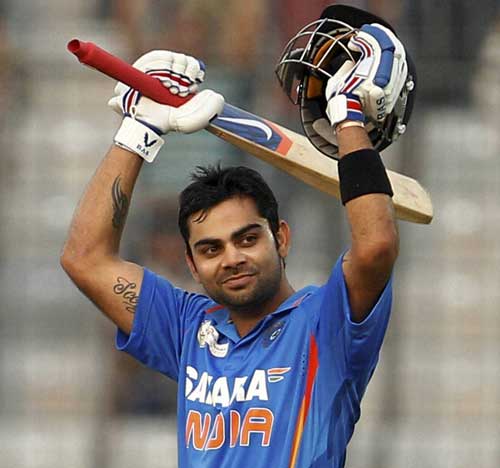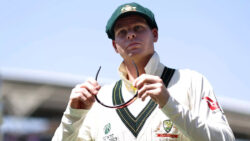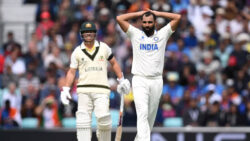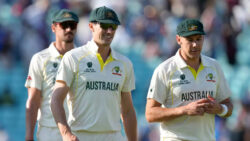Virat Kohli’s fastest ton scripts India’s historic win vs Australia


Jaipur: An inspired India pulled off an incredible nine-wicket victory over Australia in the second cricket one-dayer on Wednesday, achieving the second highest ever run chase in ODI history.
Scorecard
Chasing an mammoth victory target of 360 on a belter of a track at the Sawai Man Singh Stadium, India crossed the line with 40 balls to spare as records tumbled like nine pins. This is also India’s highest ever successful run chase as the hosts restored parity 1-1 in the seven-match series. (Highlights)
Rohit Sharma (141 not out), Virat Kohli (100 not out) and Shikhar Dhawan (95) were the main contributors for India.
Score Team Vs Overs Ground Year
438/9 South Africa Australia 49.5 Johannesburg 2006
362/1 India Australia 43.3 Jaipur 2013
350/9 New Zealand Australia 49.3 Hamilton 2007
340/5 New Zealand Australia 48.4 Auckland 2007
334/8 Australia England 49.2 Sydney 2011
Virat Kohli (100 not out) took a more than decent Australian attack to the task with a fastest ever ODI century by an Indian and seventh fastest in the world, scored in only 52 balls.
Player Runs
Balls Match Venue Year
Shahid Afridi
102 37 Pakistan vs Sri Lanka Nairobi 1996
MV Boucher 147* 44 South Africa vs Zimbabwe Potchefstroom 2006
BC Lara 117 45 West Indies vs Bangladesh Dhaka 1999
Shahid Afridi
102 45 Pakistan vs India Kanpur 1999
ST Jayasuriya 134 48 Sri Lanka vs Pakistan Singapore 1996
KJ O’Brien 113 50 Ireland vs England Bangalore 2011
Virat Kohli 100* 52 India vs Australia Jaipur 2013
This is his 16th ODI century in 115 matches. His innings had eight fours and seven sixes.
Rohit Sharma (141 not out from 123 balls) got a well-deserved third ODI century while Shikhar Dhawan (95) again showed love for anything Australian but was unlucky to miss out on a ton.
It was a match where the Australians created a world record with their five top batsmen scoring half-centuries but the Indian batsmen proved they were better on the night.
The Australians now have the ignominy of ending second best in two highest run-chases having faced similar fate against Herschelle Gibbs’ South Africa seven years back, when they failed to defend a mammoth score of 434.
Indian batting’s ‘Gen-Next’ troika showed why they are not afraid of any target and reasserted India’s supremacy in the 50-over format.
While bowling continues to be a worrying factor for skipper Mahendra Singh Dhoni, he should at least feel happy that Kohli along with Rohit and Shikhar are ready to take the legacy of Indian batting forward in the next decade.
The victory was built on two partnerships. An opening stand of 174 between Dhawan and Rohit followed by another 186 runs scored in only 17.2 overs between Rohit and Kohli. The duo put on 100 runs in only 62 balls.
The chase practically started in the ninth over when Dhawan, in his bid to break the shackles, hit Shane Watson for three successive boundaries.
In the next over from Clint McKay, Rohit got a couple of boundaries more as 26 runs came off these two overs. While Dhawan repeatedly charged out to the pacers piercing the off-side cordon, Rohit used field restrictions to good effect by lofting the deliveries over in-field.
Rohit hit Glenn Maxwell for a six over deep mid-wicket to bring up the team’s 100 and then got his half century with a tickle down leg-side off Xavier Doherty.
If Dhawan muscled the deliveries, Rohit found a way to caress them to the boundary.
However, after reaching his 50, Dhawan upped the ante with some sizzling strokeplay before James Faulkner got him to edge one trying to hit one shot too many. His 86-ball stay had 14 sweetly timed boundaries as he missed out on what would have been a well-deserved hundred.
Kohli did not take time to settle down as he raced to a half-century in only 27 balls with four huge sixes. Whether hitting Faulkner over long-off or smashing Watson over deep mid-wicket, each shot came out of the top drawer as India steadily inched towards victory with minimum fuss.
Earlier, Australian batsmen yet again took the Indian bowling attack to the cleaners as they scored a massive 359 for five, equaling their highest ever total against India.
Led from the front by their skipper George Bailey (92 not out), the Australian batsmen made merry of a listless Indian attack on a good track.
This incidentally is Australia’s highest total on Indian soil surpassing their previous best of 350 for four in Hyderabad in 2009. This total also equalled their highest ever total of 359 for two against India made during 2003 World Cup final in South Africa as well as 359 for four in a VB Series match in Sydney back in 2004.
Phil Hughes (83), Aaron Finch (50), Shane Watson (59) set up the platform for skipper Bailey and Glenn Maxwell (53) to finish the innings with a flourish.
Indian bowlers conceded 122 runs in the last 10 overs of the innings as Bailey and Maxwell sent the Indian attack on a leather-hunt putting on a staggering 96 runs in only 8.3 overs for the fourth wicket.
Bailey bludgeoned the Indian bowling as he faced only 50 balls in his unbeaten innings, hitting eight fours and five sixes.
Both Ishant Sharma (0/70 in 9 overs) and Bhuvneshwar Kumar (0/54 in 10 overs) lacked penetration as both Finch and Hughes negotiated the duo with ease.
The third seamer R Vinay Kumar was guilty of bowling either too short or only slower deliveries and it only added to skipper Mahendra Singh Dhoni’s woes. Vinay (2/73 in 9 overs) had the worst figures among the pacers.
The worst among the Indian bowlers was though left-arm spinners Ravindra Jadeja (0/72 from 10 overs) and Yuvraj Singh (0/35 from four overs) and the duo gave away 107 runs in 11 overs between them. Ravichandran Ashwin (1/50 from eight overs) fared marginally better.
While Finch, as usual, was at his attacking best, Hughes complemented him by playing the second fiddle to perfection.
Any width outside the off-stump was dealt with severity by Finch, who also pulled a slow bouncer from Vinay Kumar for a six to complete his second successive half-century of the series.








